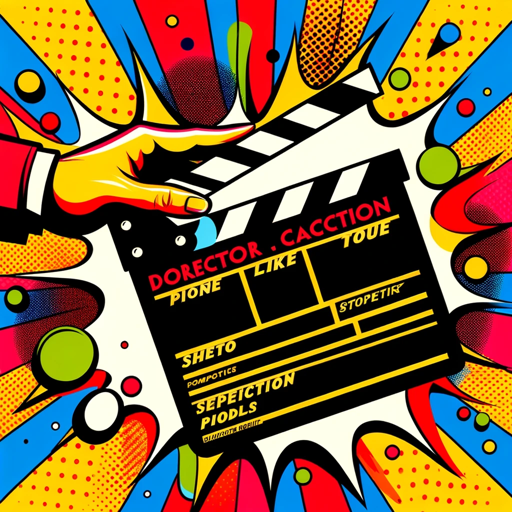UX GPT-AI UX design assistant tool.
AI-powered insights for UX design success.
👋 Hi UX GPT Bot
📄 I have a UX Design Challenge.
Related Tools
Load More20.0 / 5 (200 votes)
Introduction to UX GPT
UX GPT is an advanced AI-powered tool designed specifically to assist UX design teams with their research, analysis, and ideation processes. Created by Mahesh V V, the bot is tailored to streamline the UX workflow by offering targeted insights, competitive analysis, and research method suggestions. UX GPT functions as an autonomous extension of the UX team, capable of conducting complex tasks such as 5W1H analysis, affinity mapping, and user persona creation. For instance, if a UX team is designing a new mobile app, UX GPT can quickly generate user personas based on the target demographic and suggest the most appropriate research methods to understand user needs better. Its design purpose is to enhance the efficiency and effectiveness of UX research and design processes by leveraging AI to handle repetitive tasks, allowing UX designers to focus on more creative and strategic aspects of their work.

Main Functions of UX GPT
Insights Generation
Example
A UX designer working on a new e-commerce platform might need to quickly understand key user pain points. UX GPT can perform a 5W1H analysis to break down the problem, providing insights into the 'Who, What, When, Where, Why, and How' related to the design challenge.
Scenario
The UX team is tasked with improving the checkout process for an online store. UX GPT uses the 5W1H analysis to uncover that users primarily abandon the checkout process due to a lack of trust in payment security. This insight allows the team to focus on enhancing the trustworthiness of the payment interface.
Competitive Analysis
Example
If a startup is entering a crowded market with a new fitness app, UX GPT can analyze competitors to identify gaps in their offerings. The tool might find that while most competitors focus on workouts, few provide personalized nutritional advice, suggesting an opportunity for differentiation.
Scenario
The UX team of a new fitness app wants to position their product uniquely. UX GPT conducts a competitive analysis and reveals that existing apps lack integration with wearable devices for real-time workout tracking. The team then prioritizes this feature in their design, giving them a competitive edge.
Research Method Suggestion
Example
When redesigning a healthcare application, a UX researcher may be unsure which method to use to gather patient feedback. UX GPT suggests conducting user interviews, detailing why this method is suitable and how it can be efficiently implemented.
Scenario
A hospital is developing a new patient portal and needs to gather qualitative insights from elderly patients. UX GPT recommends user interviews, outlines how to recruit participants, and provides a set of tailored questions to explore patients' needs and challenges.
Ideal Users of UX GPT
UX Designers and Researchers
UX GPT is particularly beneficial for UX designers and researchers who need to perform extensive user research, competitive analysis, and design ideation quickly. These professionals can leverage the bot's capabilities to automate repetitive tasks, gain deeper insights, and focus on more creative aspects of design. For example, a UX researcher can use UX GPT to generate a detailed user persona, freeing up time to concentrate on designing the user journey map.
Product Managers and Startups
Product managers and startup teams who are responsible for bringing new digital products to market will find UX GPT invaluable. The tool helps them quickly understand the competitive landscape, identify user needs, and define product features that align with market opportunities. For instance, a startup founder could use UX GPT to perform a competitive analysis, ensuring their product offers unique value propositions compared to existing market players.

Guidelines to Use UX GPT
Step 1
Visit aichatonline.org for a free trial without login; no need for ChatGPT Plus subscription.
Step 2
Familiarize yourself with UX GPT's interface to easily navigate its features, including insights generation, competitive analysis, and research methods.
Step 3
Define your design challenge clearly and input relevant information for precise and tailored UX insights.
Step 4
Select options based on your needs, such as conducting competitive analysis, suggesting research methods, or creating user personas, to streamline your design process.
Step 5
Leverage the detailed guidance, tools, and resources provided to optimize your research and design outcomes, utilizing tips for maximizing insights extraction and analysis.
Try other advanced and practical GPTs
Pharma Regulatory Guide
AI-powered pharmaceutical regulatory guidance

42master-zhou
AI-Powered Writing Precision

Email Tailor
AI-Powered Email Crafting Simplified

Chinese Traditional Joke Bot (中国传统笑话机器人)
AI-powered jokes in the style of Ma Sanli.

Crooked Recipes
AI-Powered Custom Recipe Creation

React Assistant
AI-Powered Assistance for React Developers

Chess Mate
AI-Powered Chess Game Assistant

ツイート クラフター
AI-Powered Tweet Crafting Made Easy

Privacy Policy Generator
Generate compliant privacy policies effortlessly with AI.

Cinematic Muse
AI-powered creativity for storytellers.

The Debate SuperPrompt.
AI-powered tool for structured debates

TapTap
AI-Powered Game Discovery
- Competitive Analysis
- User Insights
- Persona Creation
- Feature Ideation
- Design Research
Frequently Asked Questions about UX GPT
What is UX GPT designed for?
UX GPT is an AI-powered tool designed to assist UX professionals with design challenges, providing insights, conducting competitor analysis, suggesting research methods, and creating user personas and journey maps, all tailored to specific needs.
How does UX GPT differ from other AI tools?
Unlike generic AI tools, UX GPT is specifically tailored for UX design processes, offering domain-specific insights, 5W1H analysis, competitive landscape evaluation, and detailed research methodologies to enhance the design workflow.
What are common use cases for UX GPT?
Common use cases include conducting in-depth competitive analysis, generating user personas, creating user journey maps, brainstorming design features, and optimizing research methods for design challenges.
Do I need any specific skills to use UX GPT?
No special skills are needed; UX GPT is designed with an intuitive interface, guiding users through each step of the process with clear instructions, making it accessible even for those new to UX design research.
Can UX GPT be used for academic or research purposes?
Yes, UX GPT can be used for academic research by offering detailed analysis and structured methodologies, making it valuable for students, educators, and researchers in UX, design thinking, and related fields.